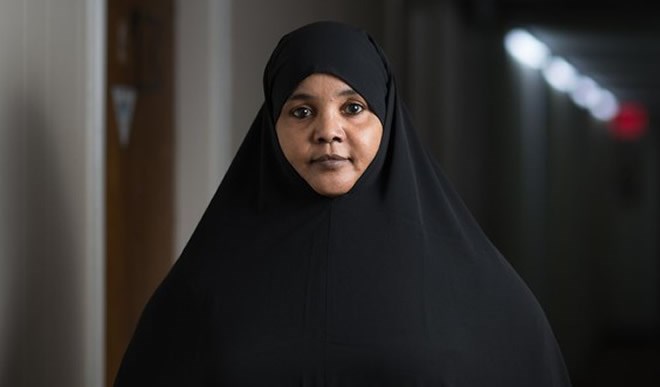Regina Leader-Post
Saturday January 23, 2021
By Arthur White-Crummey
Refugees to Saskatchewan are dealing crowded households, stranded relatives and loneliness as they adapt to a new culture and a pandemic.

Sharifa Abubakar, a Somali refugee, stands in the hallway near the office of Prairie Somalis in Regina, Saskatchewan on Jan. 20, 2021. Abubakar's husband is stuck overseas partly due to COVID-19 delays. PHOTO BY BRANDON HARDER /Regina Leader-Post
Sharifa Abubakar is waiting for her husband.
He’s two continents and an ocean away, in Kenya, awaiting a visa. COVID-19 closed the immigration offices. She’s been waiting since before the pandemic, but she blames the virus for slowing down the process and leaving her alone.
“I’m getting crazy about that, because I’m missing my husband,” she said. “I pray, please God, bring my husband back.”
Abubakar has lived in Canada since 2006. She built up a network of support, got a job and found a circle of friends she could rely on. But like it did for so many, the pandemic tore that life apart.
“Before the pandemic, life was normal,” she said through an interpreter. “I could go out to do everything I wanted to do. We used to get together as a woman(‘s) group … learn from one another, help each other, support each other. That’s not happening.”
In many ways, Abubakar is better prepared than others. Her two kids are grown up. She can manage a conversation in English, though she needs help for complicated questions. She knows it’s tougher for those who had just arrived, right before everything changed.
Fatumo is one of them. Like Sharifa, the pandemic has kept her family apart and ripped up roots she’d built in her new country.
A Somali refugee unfamiliar with the media, Fatumo worries about how she’ll be viewed in her new community and asked to withhold her last name. She arrived in Canada in July from a Kenyan refugee camp. She found a place to rent. Her kids were in school. She was hoping to quickly bring her two remaining children and her husband to Canada.
“All of a sudden, corona hit in early 2020,” she said through an interpreter. “That’s when things got difficult.”
Fatumo has nine children. Seven live with her in Canada. She managed to find a five-bedroom home using federal support. But she had to downsize when her 12-month refugee payments ran out and she moved to less general provincial income support.
“We couldn’t find a job because of the COVID-19 and I could not maintain that place so now I scaled down and moved to a three-bedroom,” she said.
That was bad enough. But whenever schools moved to online learning, that crowded home became their classroom.
“I put them two in each bedroom, and others in the living room, and I have to police them so they don’t fight each other for the computer,” Fatumo remembers.
Before the pandemic, Fatumo had people to call on. She’d formed relationships with Regina’s Somali community. But the virus left those links “almost completely destroyed.” She had few places to turn.
“Other people who used to come and help me are also afraid for themselves, so they cannot visit and check on me,” she said. “They can’t help me because everybody’s now afraid for their own life.”
Fatumo’s story is only one of hundreds, as recent immigrants to Saskatchewan struggle to find their place in a new country amid the isolation of public health measures. Like Sharifa, she’s had to do it without the support of her husband.
They were separated as they tried to make a living in Kenya. She stayed in the refugee camp while he left. Before he returned, she applied to immigrate to Canada through a program for single mothers. She had to leave him behind. But it was even more painful to say goodbye to two teenage boys who stayed with him.
“I’m a mom. And I don’t sleep at night thinking about my kids all the time in the refugee camp,” Fatumo said.
“Knowing that they are not with me, and I can’t bring them here, I am struggling, she added. “As a mom it’s the biggest challenge that I have.”
Fatumo blames the pandemic for keeping one of her children away from her. His application has been approved, but the pandemic ground the process to a halt.
“It’s lingering every day,” she said. “It’s just because of delays in the system because of COVID.”
“I worry a lot about the situation,” she said. “But I’m also thankful because I’m here and not many people get that chance. As a Muslim person, she said, I trust God that one day my situation will change.”
The pandemic has also hindered Fatumo’s efforts to integrate into her new community. She had joined an English as a second language program at the University of Regina, but couldn’t keep up with online classes due to poor knowledge of computers.
“It’s really very difficult not knowing the language,” she said. “It’s so difficult that even I can’t read my own mail. I have to go find someone to read for me.”
Despite her challenges, Fatumo doesn’t ever regret coming to Canada, even if she’s left to fend for herself in the midst of a pandemic.
“I will never regret that because I’m better off being here,” she said.